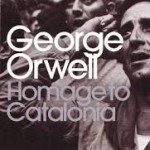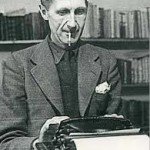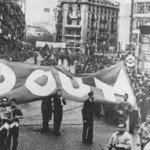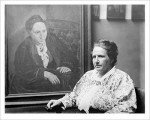Orwell’s Nightmare: 75 Years Later
George Orwell, Homage to Catalonia (1938).
Last year marked the 75th anniversary of the publication of George Orwell’s Homage to Catalonia. Adam Hochschild’s essay, “Orwell: Homage to the ‘Homage’,” New York Review of Books, Dec. 19, 2013, can be found at http://www.nybooks.com/articles/archives/2013/dec/19/george-orwell-homage/?insrc=toc. Below is a slightly updated version of my decade-old reading of Orwell’s Homage. Though we’re just a tad tardy in noting this anniversary, remembering Orwell on the day of the opening of the winter Olympics in Russia seems appropriate enough.
*
Each of us who reads has a list of landmark books –“landmarks” in the sense of defining moments in our own intellectual and emotional development. One such book on my list is George Orwell’s memoir of the Spanish Civil War, Homage to Catalonia (1938). I can’t remember exactly when I first read it, but I’m pretty sure that it was sometime after I had actually seen the city of Barcelona, Spain, the capital of Catalonia, which I visited in 1959 as an 18-year-old sailor in the U.S. Navy, and which is where Orwell’s book opens in late 1936.
I still recall being both excited and charmed by Barcelona’s beauty, by its broad main boulevard, the Ramblas, and its continental cafes. I noticed the ubiquitous presence of its Civil Guard police, with their guns and distinctive black matador-style headgear, but I had only the fuzziest notion of who the country’s ruler, General Francisco Franco, really was. Reading Orwell’s book about Spain was integral to my political education. In the centenary year of Orwell’s birth, I re-read Homage to Catalonia–as it happens, during the American punitive expedition to Iraq in April 2003.
Though I encountered Orwell’s book about a quarter-century after it had first been published, its concerns were still relevant then, the early years of the Cold War, and re-reading it some 65 years after its original and obscure publication, the book remains a powerful literary experience. More important, its dark vision, what I’ll be calling “Orwell’s nightmare,” still seems to me germane to our situation today.
Why is Homage to Catalonia so enduringly poignant? Albert Camus’s remark about what the experience of the Spanish Civil War meant to people like Orwell puts it eloquently: “It was in Spain that men learned that one can be right and yet be beaten, that force can vanquish spirit, that there are times when courage is not its own recompense. It is this, doubtless, which explains why so many men, the world over, regard the Spanish drama as a personal tragedy.”
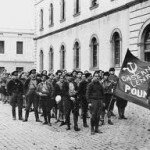 “In the Lenin Barracks in Barcelona, the day before I joined the militia, I saw an Italian militiaman standing in front of the officers’ table,” Orwell begins, embarking upon his sustained narrative of a doomed revolution. The first impression, a fleeting, anonymous, but passionate encounter, no more than a firm handshake with a stranger, strikes one of the book’s keynotes: “It was as though his spirit and mine momentarily succeeded in bridging the gulf of language and tradition, and meeting in utter intimacy.”
“In the Lenin Barracks in Barcelona, the day before I joined the militia, I saw an Italian militiaman standing in front of the officers’ table,” Orwell begins, embarking upon his sustained narrative of a doomed revolution. The first impression, a fleeting, anonymous, but passionate encounter, no more than a firm handshake with a stranger, strikes one of the book’s keynotes: “It was as though his spirit and mine momentarily succeeded in bridging the gulf of language and tradition, and meeting in utter intimacy.”
Immediately, Orwell provides a glimpse of the feelings of international solidarity that brought foreigners like himself and the Italian militiaman to the Spanish War. That militiaman, never to be seen again, “stuck vividly in my memory. With his shabby uniform and fierce pathetic face he typifies for me the special atmosphere of that time. He is bound up with all my memories of that period of the war–the red flags in Barcelona, the gaunt trains full of shabby soldiers creeping to the front, the grey war-stricken towns further up the line, the muddy, ice-cold trenches in the mountains.”
Equally, from that initial anecdote, we see that Orwell matters, to use the concept in the title of Christopher Hitchens’ Why Orwell Matters (2002), first, because he’s a very good writer, of which there can never be too many. He is simply and consistently a pleasure to read, as anyone knows who has read no more than his brief essay, “Shooting an Elephant,” or his assessment of his own literary times and his contemporary Henry Miller, in “Inside the Whale.”
Orwell is one of those writers who makes the rest of us feel self-conscious about writing. In his renowned 1945 essay, “Politics and the English Language,” and his equally famous dictum, “Good prose is like a window pane,” Orwell argues for transparency and a plain style. Most of what he says about the relation of language to politics is true but, as many dissenting critics have pointed out, good prose is not necessarily, or at all times, like a window pane, and the plain style can become a guise that merely gives the impression of transparency. What makes Orwell’s prose powerful is not simply an uncluttered style, but Orwell’s intelligence. Orwell’s more than half-century-old essay on writing in relation to politics has continued to influence and provoke writers.
Second, Orwell is one of the best political writers of the 20th century, of which there are very few indeed. As Hitchens observes about the “very many ‘creative writers’ with high political profiles” who were contemporaneous with Orwell, “It is fairly safe to say that the political statements made by these men would not bear reprinting today… However, and by way of bold contrast, it has lately proved possible to reprint every single letter, book review and essay composed by Orwell without exposing him to any embarrassment.”
The experience of the Spanish War and then writing about it in “white-hot anger” was the turning point of Orwell’s life. As Orwell says in his 1946 essay, “Why I Write,” “The Spanish War and other events in 1936-37 turned the scale and thereafter I knew where I stood. Every line of serious work I have written since 1936 has been written, directly or indirectly, against totalitarianism and for democratic Socialism, as I understand it. It seems to me nonsense… to think one can avoid writing of such subjects. Everyone writes of them in one guise or another… The more one is conscious of one’s political bias, the more chance one has of acting politically without sacrificing one’s aesthetic and intellectual integrity… What I have most wanted to do throughout the past ten years is to make political writing into an art.” Finally, Orwell matters because of what I call “Orwell’s Nightmare,” which I’ll address momentarily.
For those who don’t know, or have forgotten, the details of the Spanish Civil War and Orwell’s experiences there, it may be helpful to recall that the war began in mid-1936. It was a rebellion against the elected left-of-centre Republican government by the right-wing General Francisco Franco, who was supported by the fascist governments of Germany and Italy. The Spanish Loyalists, as partisans of the government were also known, received support from the Soviet Union while, notably, England and France stood aside, part of their “appeasement” of the fascist regimes. The Spanish Civil War had an enormous impact on all of Europe. It was not only the prelude to World War II, but as the continent’s ideological battleground, it shaped the minds of an entire generation.
Orwell went to Barcelona in late 1936, ostensibly as a journalist, but promptly signed up with one of the Marxist militias, POUM (Partido Obrero de Unificacion Marxista), and served on the front lines for several months. He arrived in Spain admittedly naïve about the internecine political factions that made up the Loyalist forces and, semi-inadvertently, volunteered for a group that is sometimes described as Trotskyist, and that was also politically close to the Spanish Anarchists. POUM would shortly be singled out as an enemy of the revolution and eventually destroyed by order of the Spanish Communist Party, which was, to a large extent, controlled by the Communist Party of the Soviet Union. At the time, the Soviet Union was under the dictatorship of Josef Stalin and was in the midst of its own hideous infra-party struggle, highlighted by a series of trumped up Purge Trials allegedly intended to rid the ruling party of the influence of Leon Trotsky, a prominent figure in the 1917 Russian Revolution. Trotsky, once an ally of Stalin, became his rival in the struggle for succession after the death of V.I. Lenin, the revolution’s leader. Stalin forced Trotsky into exile and eventually had him assassinated.
Meanwhile, Orwell, while on leave from the front, witnessed and semi-participated in a sort of civil war within the Civil War that broke out among leftist factions in Barcelona in May 1937. He went back to the front a few days later, was seriously wounded at the end of May–shot in the throat by a sniper–and returned to Barcelona to recuperate, but was forced to flee Spain less than a month later, a step ahead of the police, wanted because of his political association with POUM, which had been outlawed by the Republican government. Hundreds or even thousands of POUM’s adherents were arrested, jailed and, in many cases, executed. Orwell had been in Spain, altogether, 6 or 7 months.
I am using the word “nightmare” both literally, as a very bad dream, and in two metaphoric senses: first, as a colloquial metaphor to refer to a situation that is a disaster, and then in the more encompassing sense of a dark vision. For at least 10 years after the Spanish war, Orwell was visited with terrifying dreams, which often took the form of suddenly finding himself outdoors “with no cover and mortar shells dropping round me.”
Much of the Spanish Civil War itself can be described metaphorically as a nightmare. Among the disasters: first, the Fascists won the war and Franco ruled Spain until his death in 1975; second, the European democracies, principally England and France, abstained from the war, partially on the grounds that the elected Spanish Republic was or would become “Red,” and thus they paved the way for a more extensive world war than might otherwise have happened if they had opposed fascism earlier. Third, the Soviet Union indirectly participated in the war, with dubious consequences that are still argued about today, but did not succeed in forestalling Spanish, Italian or German fascism. Thus, fourth, the possibility, if there was one, of a genuinely democratic Spanish revolution was gutted. Fifth, and perhaps most painfully for the sense of betrayal it produced among combatants like Orwell, the dominance of the Communist Party among the forces of the Spanish Left precipitated a truly nightmarish liquidation of other leftist groups, complete with false accusations of collaboration with the enemy, imprisonment, torture, and execution. All of this was accompanied, as a writer of Orwell’s linguistic sensitivities was aware, by a horrible mangling of language that emptied it of meaning. Finally, the conduct of the war, as Orwell’s account makes plain, was itself a nightmare of battlefield suffering, inadequately armed or trained troops, failed tactics, and all the discomforts, boredom and horrors of deadly war.
In June 1937, Orwell returned to England, a place where it was hard “to believe that anything is really happening anywhere.” As he says in the bucolic but ominous concluding passage of Homage to Catalonia: “Down here it was still the England I had known in my childhood: the railway-cuttings smothered in wild flowers, the deep meadows where the great shining horses browse and meditate… and then the huge peaceful wilderness of outer London, the barges on the miry river, the familiar streets, the posters telling of cricket matches and Royal weddings, the men in bowler hats, the pigeons in Trafalgar Square, the red buses, the blue policemen–all sleeping the deep, deep sleep of England, from which I sometimes fear we shall never wake till we are jerked out of it by the roar of bombs.” The bombs prophecied by Orwell would come soon enough.
Immediately upon his return, Orwell set to work, writing a torrent of articles, letters, reviews of new books about the Spanish War, and the manuscript that would be Homage to Catalonia. His first piece, “Spilling the Spanish Beans,” published at the end of July 1937, which begins with Orwell assessing blame for the state of British ignorance about the war, dubiously declares, “I honestly doubt… whether it is the pro-Fascist newspapers that have done the most harm. It is the left-wing papers [especially the Communist Party paper, the Daily Worker]… with their far subtler methods of distortion that have prevented the British public from grasping the real nature of the struggle.” The claim is dubious insofar as the left-wing papers had a limited circulation. Orwell means not the “British public” but the British Left.
That aside, Orwell’s main point is this: “The fact which these papers have so carefully obscured is that the Spanish Government (including the semi-autonomous Catalan Government) is far more afraid of the revolution than of the Fascists… There is no doubt whatever about the thoroughness with which it is crushing its own revolutionaries. For some time past a reign of terror–forcible suppression of political parties, a stifling censorship of the press, ceaseless espionage and mass imprisonment without trial–has been in progress. When I left Barcelona in late June the jails were bulging… The point to notice is that the people who are in prison now are not Fascists but revolutionaries; they are there not because their opinions are too much to the Right, but because they are too much to the Left. And the people responsible for putting them there are… the Communists.”
In Homage to Catalonia, Orwell provides an extended if reluctant account of this political struggle. He says, “It is a horrible thing to have to enter into the details of inter-party polemics; it is like diving into a cesspool,” and he twice advises readers who are not “interested in the horrors of party politics” to “please skip.” I too will skip the details of this part of the nightmare as not germane here, but with the reminder that, for anyone who has ever engaged in political activity, it is precisely the details of such arguments about tactics that are crucial. (See everything from the diffuse Occupy movement to the Arab Spring, which has turned, 3 years later, into an Arab Season in Hell.)
Orwell, it should be noted, was uneasy, on literary grounds, about the chapters describing that struggle, and near the end of his life expressed a wish to revise the book. Some recent editions of Homage to Catalonia move the book’s two extended political chapters to an appendix at the end of the book, as Orwell apparently intended for a revised edition. The best account of the problem is in Orwell’s “Why I Write,” where he says, “I did try very hard in [Homage to Catalonia] to tell the whole truth without violating my literary instincts. But among other things, it contains a long chapter, full of newspaper quotations and the like, defending Trotskyists who were accused of plotting with Franco. Clearly, such a chapter, which after a year or two would lose its interest for any ordinary reader, must ruin the book. A critic whom I respect read me a lecture about it. ‘Why did you put in all that stuff?’ he said. ‘You’ve turned what might have been a good book into journalism.’ What he saidf to me was true, but I could not have done otherwise. I happened to know, what very few people in England had been allowed to know, that innocent men were being falsely accused. If I had not been angry about that I should never have written the book.”
The gist of the debate about inter-party politics was that the group Orwell was associated with, POUM, was for immediate revolution even in the midst of the war against Franco, and the Communists were not. The Communist “line,” as characterised by Orwell was roughly, “’At present nothing matters except winning the war; without victory in the war all else is meaningless. Therefore this is not the moment to talk of pressing forward with the revolution… At this stage we are not fighting for the dictatorship of the proletariat, we are fighting for parliamentary democracy. Whoever tries to turn the civil war into a social revolution is playing into the hands of the Fascists and is in effect, if not in intention, a traitor.’” By contrast, the POUM view was approximately, “’It is nonsense to talk of opposing Fascism by bourgeois “democracy.” …The only real alternative to Fascism is workers’ control. If you set up any less goal than this, you will either hand victory to Franco, or, at best, let in Fascism by the back door… The war and the revolution are inseparable.’”
The whole of Orwell’s analysis is considerably more nuanced than I’ve indicated. “There was much to be said on both sides,” he concedes, and for much of the time, he “preferred the Communist viewpoint to that of the POUM.” As an indicator of Orwell’s ambivalence, at one point he contemplated transferring from the POUM militia to the Communist-controlled International Brigades, which he would have done but for the situation that required him to flee Spain altogether. It was only with the crushing of leftist forces by the Communists that Orwell changed his mind, and was impelled “to try and establish the truth, so far as it is possible.”
Was Orwell right about the internal politics of the Spanish Civil War? Certainly, he was accurate in his portrait of the brutal extermination of revolutionary factions by the Communists, and he was among the first to oppose the Communists as totalitarians, of the same order as the Fascists. Even Arthur Koestler, Orwell’s anti-totalitarian friend, didn’t recognize the totalitarian aspects of Communism immediately. His anti-Communist novel, Darkness at Noon, didn’t appear until 1940. As Orwell says in his 1944 essay about Koestler, “The sin of nearly all leftwingers from 1933 onwards is that they have wanted to be anti-Fascist without being anti-totalitarian.”
Orwell wasn’t right in his tendency to conflate Fascism and capitalism, a view that echoed the Communist line through much of the 1930s. This is among the few murky areas in Orwell’s thinking, but some of the confusion can be atrributed to Orwell’s two-pronged program to write against totalitarianism and for democratic socialism.
Was Orwell right in adhering to POUM’s view that the war and revolution were inseparable? I don’t think we’ll ever know. The opportunity, if it was one, was irreparably lost. It’s worth noting that the prominent Spanish Civil War historian, Hugh Thomas, who thought Orwell’s book the best firsthand account of the Spanish Civil War, also thought Orwell was wrong about tactics. According to Thomas, “If the Republicans were to have a hope of winning the civil war, the only policy was to centralize war production, delay the revolutionary process (to avoid antagonizing the peasants), [and] establish a regular army in place of the militias… The anarchists and the POUM, through greater idealism, were unable to swallow such realistic stuff…” But even if the Communists were right about tactics, there’s not much evidence that it was necessary to suppress POUM and other groups.
In Why Orwell Matters, Christopher Hitchens makes much of the claim that Orwell was right about the three great issues of the 20th century, namely, imperialism, fascism, and Stalinism. Hitchens’ critics have argued about whether Orwell was in fact right, and even whether those issues were the great ones of the 20th century. Hitchens’ most acerbic critic, Louis Menand, challenges what he calls “the ‘Orwell Was Right’ button.” Orwell, says Menand, “was against imperialism, fascism and Stalinism. Excellent. Many people were against them in Orwell’s time and a great many more people have been against them since… The important question, after condemning those things, was what to do about them, and how to understand the implications for the future. On this level, Orwell was almost always wrong.”
Here, I’m on the side of Leon Wieseltier, who chides Menand for his condescension about Orwell’s anti-totalitarianism, and adds, “As it happens, a great many people were not at all against Stalinism in the years in which Orwell wrote, and if many more people have been against Stalinism since, it is in part owing to the genuinely valiant refusal of Orwell and others to desist from their denunciations of it.”
On the whole, I think Orwell was right, or right enough, on the great political issues of his time, even though he may not have known what to do about all of them, any more than we do now, as we debate the politics of terrorism, “humanitarian intervention,” the path of empire, and what to do about greater and lesser evils. More important than being right, Orwell’s great essays, and books, principally Homage to Catalonia, Animal Farm, and 1984, are still right for us as readers and citizens.
Certainly, that wasn’t immediately apparent upon the publication of Homage to Catalonia. It was printed in an edition of 1500 copies in early 1938 by the British firm, Secker and Warburg. By the time of Orwell’s death in 1950 it had sold a mere 600 copies which, if nothing else, ought to hearten other under-appreciated authors. Though Orwell had achieved fame and sufficient means by the end of his life–both Animal Farm and 1984 were best-sellers–Homage to Catalonia found a readership only after Orwell’s death.
What I mean by “Orwell’s nightmare” isn’t fully to be found within Homage to Catalonia, but appears most starkly in a sort of epilogue, an essay written five years or so later, called “Looking Back on the Spanish War.” Writing from the midst of a larger war, Orwell’s retrospective view on the Spanish conflict revealed a cooling of some passions–the internecine struggle on the left now seemed less important, a secondary issue. But Orwell remained deeply troubled by the lies, distortions and propaganda on all sides when it came to assessments of the history of the Spanish Civil War. In a passage that is key to understanding Orwell’s subsequent work and his apprehension of the future, he writes, “This kind of thing is frightening to me, because it often gives me the feeling that the very concept of objective truth is fading.”
Orwell’s nightmare, I think, is not so much the imagination of the future portrayed in 1984, but rather the eradication of the past, the erasure of memory. “How will the history of the Spanish War be written?” Orwell asks. “After all, some kind of history will be written, and after those who actually remember the war are dead, it will be universally accepted. So for all practical purposes the lie will have become truth.” That is, we are not here engaged in a post-modernist debate about truth, or the parody of such a debate frequently conjured up by self-proclaimed opponents of contemporary pragmatist philosophy. Whether or not there is objective truth about the past to be had–Orwell thought there was–the nightmare is that it won’t matter whether or not there is, rather “what is peculiar to our own age is the abandonment of the idea that history could be truthfully written.”
Although the past might be filled with deliberate lies and inadvertent mistakes, “in practice there was always a considerable body of fact which would have been agreed to by almost everyone.” What Orwell most fears is the loss of “just this common basis of agreement”; this is precisely what totalitarianism destroys. “The implied objective of this line of thought,” Orwell says, “is a nightmare world in which the Leader, or some ruling clique, controls not only the future but the past. If the Leader says of such and such an event, ‘It never happened’–well, it never happened. If he says that two and two are five–well, two and two are five. This prospect frightens me much more than bombs–and after our experiences of the last few years that is not a frivolous statement.”
Of course, now we know that the nightmare Orwell contemplates in “Looking Back on the Spanish War” is precisely the subject matter he would address in his last novel, 1984. The daily occupation of his protagonist in that book, Winston Smith, is the perpetual false re-writing of the past, and one of Orwell’s greatest literary creations, the character O’Brien, tortures Smith into believing, at least briefly, that two plus two are five.
One of the most astute accounts of why Orwell matters is to be found in the 1989 essay about Orwell by Richard Rorty, the philosopher who is often taken to be the chief contemporary “denier of truth.” I won’t reprise the entirety of Rorty’s essay, “The Last Intellectual in Europe: Orwell on Cruelty,” but merely point to a few passages that have some relevance to my thesis. Rorty remarks that “Orwell’s best novels will be widely read only as long as we describe the politics of the twentieth century as Orwell did… Orwell thought of our century as the period in which ‘human equality became technically possible’ and in which simultaneously, ‘practices which had long been abandoned, in some cases for hundreds of years–imprisonment without trial, the use of war prisoners as slaves, public executions, torture to extract confessions… –not only became common again, but were tolerated and even defended by people who considered themselves enlightened and progressive.’”
Rorty believes Orwell will continue to be widely-read for some time. “Someday this description of our century may come to seem blinkered or shortsighted,” he allows. “If it does, Orwell will be seen as having inveighed against an evil he did not entirely understand… Some present-day leftist critics think that we already have a way of seeing Orwell as blinkered and shortsighted. They think that the facts to which he called attention can already be put in a context within which they look quite different. Unlike [them], I do not think that we have a better alternative context. In the 40 years since Orwell wrote, as far as I can see, nobody has come up with a better way of setting out the political alternatives which confront us.”
Rorty reiterates the above point when he says, “On my view, Orwell’s mind was neither transparent nor simple. It was not obvious how to describe the post-World War II political situation, and it still is not. For useful political description is in a vocabulary which suggests answers to the question ‘What is to be done?’ just as useful scientific description is in a vocabulary which increases our ability to predict and control events. Orwell gave us no hints about how to answer Chernyshevsky’s question. He merely told us how not to answer it, what vocabulary to stop using. He convinced us that our previous political vocabulary had little relevance to our current political situation, but he did not give us a new one. He sent us back to the drawing board, and we are still there. Nobody has come up with a larger framework for relating our large and vague hopes for human equality to the actual distribution of power in the world.”
Timothy Garton Ash poses the question, in one of the many “Why Orwell Matters” essays that have been written of late, Does Orwell still matter? “Why should we still read George Orwell on politics?” he asks. “Until 1989, the answer was plain. He was the writer who captured the essence of totalitarianism… Yet the world of 1984 ended in 1989… The three dragons against which Orwell fought his good fight–European and especially British imperialism; fascism, whether Italian, German, or Spanish; and communism, not to be confused with the democratic socialism in which Orwell himself believed–were all either dead or mortally weakened. Forty years after his own painful and early death, Orwell had won. What need, then, of Orwell?”
Garton Ash goes on to offer a few answers, among them, “we should read him because of his historical impact. For Orwell was the most influential political writer of the 20th century.” Garton Ash admits that saying “read him because he mattered a lot in the past” is not very exciting. He then goes on to offer “a more compelling reason we should read Orwell in the 21st century: he remains an examplar of political writing.” Garton Ash underscores Orwell’s “insight into the use and abuse of language… the central Orwellian argument that the corruption of language is an essential part of oppressive or exploitative politics.”
While Garton Ash’s reasons for reading Orwell today are true enough, my own view is that Orwell still matters because his nightmare about the erasure of the past continues to be relevant. It is true that the terms of the present political engagement may have changed. A popular expression of those changing terms is found in the title of Benjamin Barber’s Jihad vs. McWorld. While Soviet totalitarianism is gone (but not, apparently, Russian authoritarianism in Vladimir Putin’s regime) we now find ourselves describing a world of insatiable consumers in the capitalist mall and a realm of bloodthirsty tribalists and religious fundamentalists possessed of a feudal metaphysics, both of which, Barber argues, are threats to democracy no less than the version of totalitarianism that Orwell depicted. Even in Orwell’s time, there were alternative versions of the nightmare.
In October 1949, three months before Orwell’s death in January 1950, Aldous Huxley, the author of an equally renowned dystopia, Brave New World (1932), wrote poignantly to Orwell: “I had to wait a long time before being able to embark on 1984. Agreeing with all that the critics have written of it, I need not tell you, yet once more, how fine and how profoundly important the book is… The philosophy of the ruling minority in 1984 is a sadism which has been carried to its logical conclusion by going beyond sex and denying it. Whether in actual fact the policy of the boot-on-the-face can go on indefinitely seems doubtful. My own belief is that the ruling oligarchy will find less arduous and wasteful ways of governing and of satisfying its lust for power, and that these ways will resemble those which I described in Brave New World.”
This is not the place to argue the dimensions of the present dangers. It is enough to note that whether we’re talking about our young people hanging out in the mall, engrossed in the virtual destruction provided by video games, or their young people indoctrinated in fundamentalist schools and sometimes persuaded to engage in the self-and-other-destruction of suicide bombing, the possibility of a truthfully described past has been devoured by ideologies of utter indifference and misguided passion. Re-reading Orwell’s Homage to Catalonia, as I did, in the midst of the bombing of the region of the world known as “the cradle of civilization,” and the subsequent looting of the earliest-known written records of the past, added more than a touch of bitter irony to the experience.
At the end of his essay, “Looking Back on the Spanish War,” Orwell remembered the Italian militiaman who appears at the beginning of Homage to Catalonia, and he appends a few verses written in memory of that young man. The poem is conventionally sentimental and not especially memorable except for its concluding phrase, in which the generally pessimistic Orwell allows himself to briefly imagine that “No bomb that ever burst / Shatters the crystal spirit.” But in Orwell’s truer imaginings, in his nightmare, the point is that even “the crystal spirit” is shattered.
.
